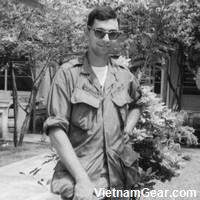
Galanos
War Story: The Ugly Face of War
15 August 2005
Louis Galanos
When Advisory Team 27 was not working with ARVN troops we would be transported by elements of the 229th Assault Helicopter Battalion at An Khe to remote areas where we would try to recruit some of the Montanyard hill people to join us in the fight against the Viet Cong. As always payments had to be made to get their cooperation.
The Montanyards were part of some 60 nomadic tribes who populated the central highlands of South Vietnam, Cambodia, and Laos and were excellent jungle fighters with many years of combat experience. The two tribes in our area were the Bahnar and the Jarai.
Some of the tribes had been recruited by the French during the French Indochina War and had no love for the Communists and were willing to fight against them and seemed willing to join with the Americans (as long as we paid them) in the fight against the Viet Cong and North Vietnamese Army.
Unfortunately they had no love for the South Vietnamese and as a result atrocities were committed by both sides on each other. In December of 1965 a group of Montanyard mercenaries revolted against their ARVN allies/rivals and killed over 20 Vietnamese officers.
After that incident orders were issued to the Vietnamese Air Force (VNAF) by the Capital Military District (CMD) commander to bomb Montanyard villages in our area if the planes had any unexpended ordinance after a mission.
These orders were never rescinded and were still in effect at the beginning of my tour of duty in Vietnam. In the fall of 1966 our unit inspected a Montanyard village in Bong Son Valley (50 miles north of Qui Nhon) after an ARVN plane bombed it with napalm. Among the smoldering ruins, smoke and the smell of burnt hair and flesh were the bodies of 30 men, women and children. Such was the rivalry between the South Viets and Montanyards.
Montanyards were not the only people to suffer at the hands of their own government. Villagers suspected of cooperating with the Viet Cong were often subjected to hideous tortures and brutal treatment.
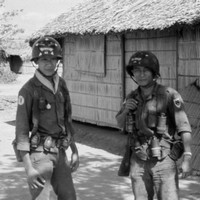
ARVN soldiers on patrol
In early 1967 we were conducting a series of patrols in an area near Pleiku with ARVN troops. Our job was to identify villages that were supporting the Viet Cong. The ARVN
Dai-uy Vietnamese for captain) who was in command had a particularly brutal reputation. He accused the village chief of Dak Ro' Son village of working for the enemy. As far as the American advisors were concerned there was no evidence apparent in the village of any support for the enemy nor any previous history of problems with the village.
The ARVN commander subjected the village chief to a series of brutal tortures while we were forced to look on. I kept looking at the American CO to see if he would try to stop what was going on but all he did was stand there apparently seething with anger.
The interrogation resulted in nothing of value. Frustrated, the ARVN commander ordered his men to burn down the village and evacuate all the people to a detention camp. Our American commander protested to the ARVN commander but he didn't have the authority to override his order. All he could do was radio Camp Radcliff and advise them what was going on. The higher ups at Radcliff acknowledged the report but declined to get involved.
Two of the villagers protested at what had been done to the village chief and the order to burn and evacuate the village. After listening to them the ARVN commander shot both of them with his .32-caliber service pistol.
Atrocities like this and others that I had witnessed began to disillusion me and even though I discussed them with my superiors back at Qui Nhon HQ, the official attitude seemed to be, “don't rock the boat and make waves.”
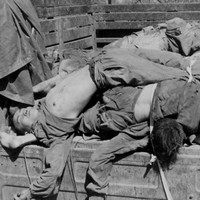
NVA soldiers KIA
Another activity that I detested was the orders from higher ups to do “body counts.” Whenever the brass had to show material evidence that we were “winning the war” we had to go back to the scene of a firefight and collect as many dead enemy soldiers as possible and fly them back to base in order to participate in a “show and tell” for the media. Since the VC rarely left any bodies behind, those we did find were few in number and also in very poor condition.
Fortunately I was warned in advance on how to prepare for my first “body count.” Not only did I wear my M17 gas mask but I managed to get a pair of heavy duty rubber gloves from a friend in Graves Registration. I also decided not to wear my glasses so anything I saw would be slightly out of focus.
Despite these precautions I would usually get nauseous and after emptying my stomach would continue to have dry-heaves until the mission was over. Even after hours back at base and a thorough scrubbing in the shower the smell of rotting corpses stayed in your sinuses and on your person for what seemed like days.
After two of these experiences I wrote to my mother and asked that she send me some winter green oil. When rubbed on a scarf and wrapped around your face it did an effective job in minimizing the smell. However, even to this day if I catch the smell of some dead animal on the side of the road it immediately reminds me of Vietnam.
Things were gradually changing in Vietnam at the end of 1966 and into the early months of 1967 due mainly to the huge influx of troops to the war zone. The great build up was on and would culminate in over one-half million American troops in Vietnam by the time I got my DEROS (Date of Estimated Return from Overseas).
Enlisted men in all combat units were well aware that many of the officers coming over at this time knew they needed to get some command time under their belt in order to “punch their ticket.” This was a necessary step if officers expected to get that next promotion and continue with their career.
On top of all this was the Army policy that an officer's command time with a combat unit was limited to 6 months. This constant rotation of officers would allow more of them to get their command time. The end result was that combat units would often have several commanders during an enlisted man's tour of duty.
Most of the enlisted men I knew felt that this policy of constant rotation was stupid and dangerous. Just when you get used to how one officer wants things done he is replaced and the new guy wants things done a different way. If he gets wounded and replaced you have this third officer who wants things his way.
The end result was that the men with the most combat experience (enlisted men) were often ignored by an inexperienced officer trying to prove himself as a great leader and this sometimes resulted in men wounded or killed.
In addition many of the new guys coming over to Qui Nhon in early 1967 had a much different attitude about service in Vietnam than the group I was associated with just 6 months earlier.
The bulk of the new enlisted men were draftees who had been exposed to the beginnings of the anti-war movement back in the states and resented that their lives had been interrupted. On top of this was the sad fact that a healthy percentage of them had used recreational drugs (mostly marijuana) and privately adopted the anti-establishment attitude common among many young people back in the states.
This led to friction between the guys (like me) who volunteered to serve their country. We were known as Regular Army or RA's. The draftees were known as US's. As far as the draftees were concerned the RA's were 'Lifers' and were to be treated with disrespect while the Regular Army guys thought the draftees were a bunch of hippie dope fiends and probably enemy sympathizers.
This and the issue of race relations led to a number of fights in some units and officers and NCOs were hard pressed to keep things under control. Article 15's and courts-martial were common for fighting, disobedience, going AWOL and drug offenses and the more serious of these resulted in a person being sent to Camp LBJ. The initials (a back handed slap at President Lyndon B. Johnson) referred to Long Binh Jail which was a large penal complex near Saigon that housed some really bad characters.
For those so inclined, marijuana and other drugs were readily available. The locals in and around Qui Nhon all grew marijuana for personal use but greatly desired American tobacco cigarettes. Unfortunately for the locals the tobacco cigarettes were too expensive. The American soldier however had unlimited access to cheap tobacco cigarettes through the PX and desperately wanted to find some 'weed' to smoke.
Once both sides realized what they had available to them they began a spirited exchange of product (tobacco for marijuana). This resulted in some strange smells coming from tents, barracks, latrines and a noticeable decline in troop performance and discipline.
A few career NCO's were really frustrated by this situation mainly because some of the younger officers (fresh from college ROTC programs) had smoked marijuana on a regular basis when in college and refused to discipline the enlisted men who did so.
Sensing a chance to make money, enterprising Vietnamese stepped in with some very creative ideas.
After making arrangements with a willing American soldier to buy cartons of cigarettes, a Vietnamese would then turn them over to a local business. This business would open the cartons without damaging the cardboard, open each cellophane wrapped pack without damaging it, take out the tobacco cigarettes, insert machine made marijuana cigarettes with filters, re-wrap the cellophane, and then reseal the cardboard so to the casual observer you couldn't tell if anything had been altered.
The cartons of marijuana cigarettes were then sold to the Americans for a premium who would ship them home for sale or later use.
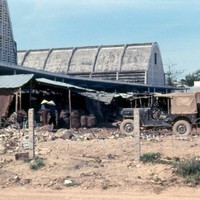
The black market
Shipping contraband home or engaging in the Black Market was common. One mess hall sergeant was caught shipping an entire set of mess hall tableware that he had intended to use for a restaurant he planned to open once he got back to the states. One of our NCO club managers was court-martialed for selling soda, cigarettes, and beer on the black market.
There was always a friendly customs inspector NCO who for a bottle of booze or some other bribe would allow you to ship home war souvenirs such as AK47s, hand grenades, bayonets, ammunition, pistols, uniforms, etc. One legendary story goes that a motor pool mechanic tried to ship a complete jeep home one piece at a time.
Only later in the war did they begin to crack down on the shipping of contraband due in part to the fact that some automatic weapons from Vietnam were making an appearance in bank robberies and other criminal activities back in the U.S.
Toward the end of my tour the abuse of drugs and hospitalizations related to sexually transmitted diseases brought great concern to the brass. It seems that discipline problems and deaths related to drugs and time lost in hospitals due to infectious diseases (mostly sexually related) were putting strains on combat and non-combat units alike to remain fully effective.
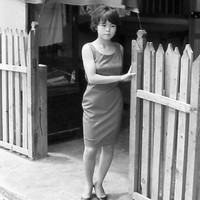
Local prostitute
Because an enlisted man could be punished (officers were not) for contracting a venereal disease from one of the many short-time girls, he would try to treat an infection secretly by getting his friendly corpsman to give him some penicillin tablets and not report the infection to the higher ups. Unfortunately the dose was not enough to cure the disease but only eliminate most of the symptoms. End result was a drug resistant and very virulent strain of gonorrhea (the clap) that resulted in a week or two in a hospital to get the cure.
Because wives and girlfriends of returning soldiers were getting infected with this new disease the military embarked on a more stringent program to identify those soldiers with infectious diseases and quarantine them. This especially applied to men who were getting close to returning home. The same went for drugs. Any evidence of drugs in your system meant you were held back. These actions provided strong motivation to clean up your act before going home.
In the final months of my tour I did what everyone else had done. I created a “short timer” calendar. Crossing off the days was an enjoyable experience as much fun as taunting some poor soul who had just arrived in-country. These guys were universally called “FNGs” which stood for Fucking New Guys.
When you got down to your last 30 days or less you get very superstitious. People tell you horror stories about guys who get killed with only days left in their tour. The stories recount how this guy or that guy lost his life in a freak accident or a friendly fire incident. You become a little paranoid as the days slowly tick off and any assignment that might put you at risk was shunned with great vigor.
The day I left my unit there was no party or parades, just handshakes from friends, a pat on the back, friends begging that I leave them my collection of Playboy magazines, and requests to write when I got back to the states. Those that were going home from the Qui Nhon area were transported to Cam Ranh Bay in a C-123 Provider. Much to our dismay the plane had just delivered some cargo to Qui Nhon and there were no nylon sling seats installed to accommodate the guys going back home.
Our choices were very limited. Ride in the aircraft with no seats or wait another couple of days for another flight. Needless to say we all got on board.
The loadmaster positioned each pair of men sitting, back to back so we could brace each other upon take off and landing. Our duffel bags and other personnel gear were secured to the bulkhead to prevent them from becoming projectiles in rough weather and also to keep our hands free so we could hold onto anything that would keep us on the flight deck.
I kept thinking that in rough weather most of us would be flying around the cabin but our luck held and all of us made it to Cam Ranh Bay in one piece.
We spent a day and a night there waiting for our orders to be processed and a charter jet (“freedom bird”) to be assigned to our group. Our accommodations were the now standard 20-foot-wide by 100-foot-long, two-story barracks. The second story was the worst place to sleep because when it rained on the galvanized metal roof the noise was so loud you had to shout to be heard. Forget about getting any sleep under those conditions.
The day arrived for us to board our plane for the ride home. It was a Braniff Airlines charter that was configured to carry almost 300 people. As soon as the wheels left the ground a terrific cheer rose up from the passengers. Ten minutes later most were relatively quiet and settling in for the long flight to the USA. Before long most of the men had fallen asleep. It seems that a lot of the men didn't sleep well on their last night in-country dreaming of all kinds of situations that might prevent them from leaving Vietnam.
We refueled twice on the way back. As you might expect, few wanted to leave the plane to explore the terminal on these stops lest the plane leave without them. Everyone was determined to get back home as quickly and safely as possible.
Our long flight ended late at night at a US Air Force base in Washington, State. They were fully equipped to handle returning soldiers and the processing didn't take long. Again, no band, no welcoming committee, and no brass to give you a hand shake or thank you for a job well done. But, we were too bloody tired from the long flight to even care. The caring didn't come until much later.
We had to have one last inspection before we could be processed for the next leg of our individual flights to our home towns. The inspection was to look for contraband in our duffel bags. I think most of the men who had anything that could be confiscated had already shipped it home ahead of time. Nothing was found.
While we were repacking our duffel bags one NCO advised us to change into civilian clothes when we got a chance. When asked why, he said that returning Vietnam vets in uniform were sometimes treated badly due to the strong anti-war sentiment sweeping the country at that time.
This statement caused a prolonged silence in the group that I was with. After what seemed like many minutes we picked up our duffel bags and quietly went to get in line for the Air Force buses that would take us to the civilian airport for the final ride home.
Read part 1 -
Welcome to VietnamRead part 2 -
First ImpressionsRead part 3 -
Aftermath
Follow us on


Copyright © VietnamGear.com. All
rights reserved. This material is intended solely for internal use within VietnamGear.com.
Any other reproduction, publication or redistribution of this material without the
written agreement of the copyright owner is strictly forbidden and any breach of
copyright will be considered actionable